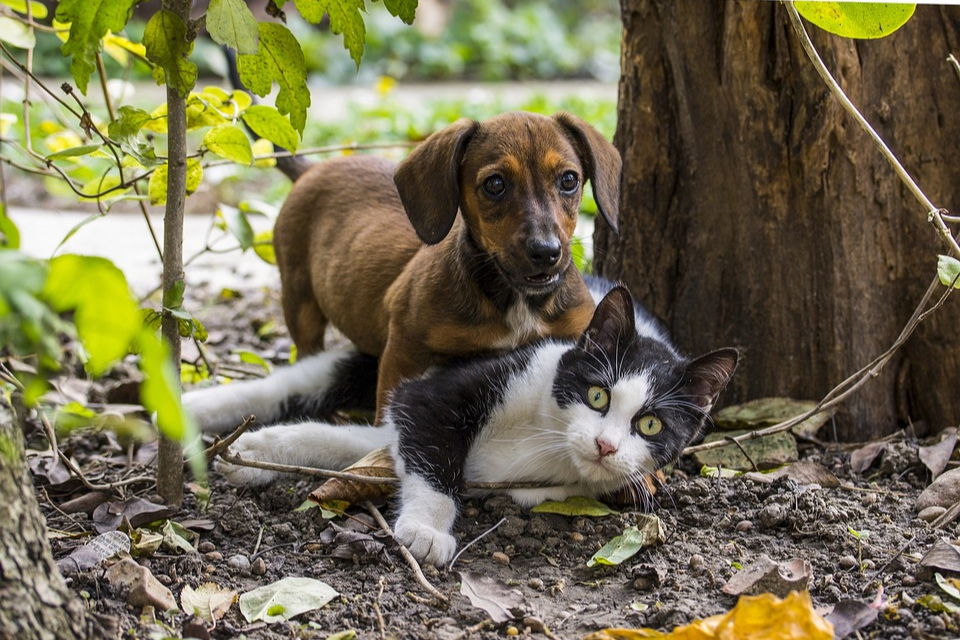Miniature Dachshunds and cats are both beloved pets that can bring joy and companionship to their owners. But can they get along? Many people wonder whether Miniature Dachshunds are good with cats, and it’s a question that deserves a thorough answer.
Miniature Dachshunds are known for their cute appearance and playful personality, but they also have a reputation for being stubborn and independent. On the other hand, cats are known for their independent nature and unique personalities. With these differences in mind, it’s important to consider whether they can live together peacefully.
In this blog post, we’ll take an in-depth look at whether Miniature Dachshunds and cats can get along. We’ll explore the characteristics of both Miniature Dachshunds and cats, and discuss the factors that can influence their relationship. We’ll also provide tips for introducing them, as well as common problems and how to address them. Finally, we’ll discuss how to promote a positive relationship between Miniature Dachshunds and cats.
Key Takeaways:
- Miniature Dachshunds and cats have different characteristics and may require a different approach to bonding.
- Common problems between Mini Dachshunds and cats include prey drive and territorial behavior.
- Techniques for promoting a positive relationship include gradual introductions, supervised interactions, and providing separate spaces for each pet.
Characteristics of miniature dachshunds
Miniature Dachshunds are a popular breed known for their long, sausage-like bodies and adorable personalities. They are small dogs that typically weigh between 8 and 11 pounds and stand 5 to 7 inches tall at the shoulder. Here are some of the characteristics that make Miniature Dachshunds unique:
Size and weight
One of the distinguishing features of Miniature Dachshunds is their small size. They are often referred to as “wiener dogs” because of their sausage-like shape. Their size makes them a popular choice for people who live in small apartments or houses. However, it’s important to note that their small size also makes them fragile and prone to injuries, especially in their backs.
Temperament
Miniature Dachshunds are known for their friendly and playful personalities. They love to be around their owners and will often follow them around the house. They are also loyal and protective of their families, making them excellent watchdogs. However, they can also be stubborn and independent, which can make them a challenge to train.
Behavior
Miniature Dachshunds are active dogs that love to play and explore. They enjoy going for walks and playing fetch, but they also have a tendency to dig and bark. They are intelligent dogs that need mental stimulation to prevent boredom.
Grooming needs
Miniature Dachshunds have short hair that requires minimal grooming. They shed moderately, so weekly brushing is recommended to keep their coat shiny and healthy. They also need their nails trimmed regularly and their teeth brushed to prevent dental problems.
In summary, Miniature Dachshunds are small dogs with big personalities. They are friendly, playful, and protective of their families, but they can also be stubborn and independent. Understanding their characteristics is important when considering whether they are a good fit for your household, especially if you have cats.
Related: Are Mini Dachshunds Good with Babies?
Characteristics of cats
Cats are beloved pets that have been popular companions for humans for thousands of years. They are independent and graceful creatures with unique personalities. Here are some of the characteristics that make cats different from other pets:
Behavior
Cats are known for their independence and aloofness, but they can also be affectionate and playful with their owners. They are curious animals that love to explore their environment and are often entertained by simple things like a crumpled piece of paper or a cardboard box.
Grooming
Needs Cats are fastidious groomers that spend a significant amount of time grooming themselves. They have retractable claws that they use to scratch and climb, which can lead to the need for regular nail trimming. Additionally, they require regular brushing to prevent matting and hairballs.
Communication
Cats communicate in a variety of ways, including body language, vocalizations, and scent marking. They use their tails, ears, and eyes to communicate their moods and intentions to other cats and their owners.
Health issues
Cats are generally healthy pets, but they are prone to certain health issues, such as dental problems, obesity, and urinary tract infections. It’s important to schedule regular check-ups with a veterinarian and to provide them with a healthy diet and plenty of exercise.
In summary, cats are independent and curious pets that require regular grooming and have unique ways of communicating with their owners. Understanding their characteristics is important when considering whether they will get along with other pets, such as Miniature Dachshunds.
Related: Are Mini Dachshunds Good for Seniors?
Can miniature dachshunds get along with cats?
If you’re considering bringing a Miniature Dachshund into a household with cats, you may be wondering whether they can get along. The answer is yes, but it depends on a few factors.
Socialization
One of the most important factors in determining whether a Miniature Dachshund can get along with cats is their socialization history. Dogs that have been socialized with cats from a young age are more likely to accept them as part of their family. However, if a Miniature Dachshund has not been exposed to cats before, they may be more likely to view them as prey.
Personality
Another factor to consider is the personality of the individual dog and cat. Some Miniature Dachshunds are more laid-back and relaxed, while others are high-strung and excitable. Similarly, some cats are more outgoing and friendly, while others are more shy and reserved. It’s important to take the personalities of both pets into account when introducing them to each other.
Training
Training is essential when introducing a Miniature Dachshund to a household with cats. It’s important to teach them basic commands, such as “leave it” and “stay,” to prevent them from chasing or harassing the cats. Additionally, providing plenty of positive reinforcement for good behavior can help reinforce the idea that cats are part of the family and not prey.
Supervision
Lastly, it’s important to supervise all interactions between a Miniature Dachshund and cats, especially during the early stages of their relationship. Never leave them alone together until you’re confident that they can get along without any issues. Even then, it’s a good idea to monitor them from time to time to ensure that their relationship remains positive.
In conclusion, Miniature Dachshunds can get along with cats, but it depends on a variety of factors, including their socialization history, personalities, and training. With proper supervision and training, it’s possible for these pets to live together happily.
Common problems between miniature dachshunds and cats
While Miniature Dachshunds and cats can get along, there are some common problems that may arise in their relationship. Understanding these issues can help pet owners prevent conflicts between their pets.
Prey drive
Miniature Dachshunds have a strong prey drive, which means they may see cats as potential prey. This instinctual behavior can lead to chasing, attacking, or even killing cats. It’s important to keep in mind that even if your Dachshund has never shown any aggressive behavior towards cats before, their prey drive can be triggered by sudden movements or changes in behavior.
Dominance
Dachshunds are known for their dominant personality, which can sometimes cause issues with cats. If your Dachshund feels like they are the alpha in the household, they may try to dominate the cat by chasing or harassing them. This can lead to a stressful and unsafe environment for both pets.
Territorialism
Cats are known for being territorial animals, and introducing a new pet into their territory can cause stress and anxiety. A Dachshund may also feel territorial, which can lead to conflicts with the cat. It’s important to introduce both pets slowly and give them plenty of space to adjust to each other.
Communication differences
Cats and Dachshunds communicate differently, which can sometimes lead to misunderstandings. While cats use body language and vocalizations to communicate, Dachshunds may use barking, growling, or even biting to express themselves. This can cause confusion and anxiety for both pets.
Food aggression
Both cats and Dachshunds can display food aggression, which can lead to conflicts if they are fed in the same area. It’s important to monitor your pets during meal times and separate them if necessary to prevent any aggressive behavior.
By understanding these common problems, pet owners can take steps to prevent conflicts between their Miniature Dachshunds and cats. With patience, training, and supervision, these pets can coexist in harmony and even form a strong bond.
How to promote a positive relationship between miniature dachshunds and cats
If you want your miniature dachshund and cat to get along, there are several steps you can take to help promote a positive relationship between them.
- Introduce them slowly: When introducing your pets, it’s important to do it slowly and in a controlled manner. Start by keeping them in separate rooms and gradually allow them to spend time together under your supervision. Keep a leash on your dog and provide your cat with an escape route if they feel uncomfortable.
- Provide each pet with their own space: Make sure each pet has their own space where they can retreat to if they feel overwhelmed or need some alone time. This could be a separate room or even just a designated corner of the house.
- Train your dog: It’s important to train your dog to obey basic commands, such as “sit” and “stay,” to help keep them under control around your cat.
- Socialize your dog: Socializing your dog from a young age can help them learn to interact with other animals in a positive way. Take them to puppy classes or arrange playdates with other friendly dogs.
- Use positive reinforcement: Reward your pets for good behavior around each other with treats and praise. This will help them associate positive experiences with each other.
- Don’t force it: Some dogs and cats simply don’t get along, and forcing them to do so can lead to aggression and anxiety. If your pets aren’t getting along, it’s important to accept this and keep them separated.
By taking these steps, you can help promote a positive relationship between your miniature dachshund and cat. Remember, each pet is an individual and may require different approaches, so be patient and observe their behavior to determine what works best for them.
Conclusion
Miniature dachshunds and cats can certainly get along, but it requires patience, effort, and a willingness to adapt to their individual personalities. By understanding the characteristics of each animal, the common problems that can arise, and how to promote positive interactions, you can help foster a loving and harmonious relationship between your pets. Remember, the key to success is to approach the process slowly, remain observant, and never force your pets to interact if they’re not comfortable doing so. With time and effort, your miniature dachshund and cat can become the best of friends.

